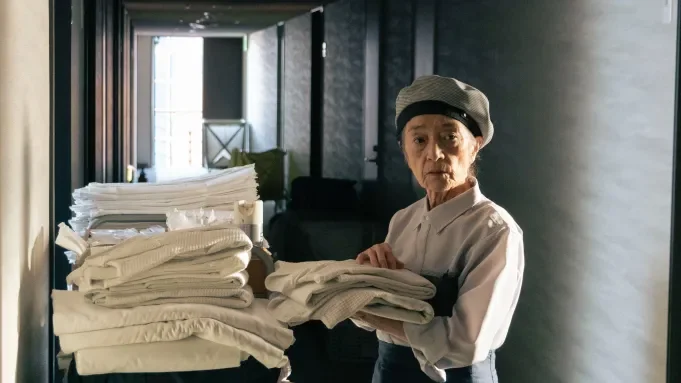CIFF: “Plan 75” - Film Review
Plan 75 begins much like a Black Mirror episode. In a hazy, out-of-focus shot set to a score of calming classical music, a young man with bloody arms is seen holding a large gun. As the picture sharpens, the audience can see overturned wheelchairs, walkers, and canes. We’re left wondering what just happened here.
This scene finds its inspiration in reality. In 2016, a Japanese man broke into a care facility and attacked forty-three people, killing nineteen. He then drove himself to the police station and turned himself in. Plan 75 frames its fictional attack around the anger of Japanese youth toward older generations. As a means of quelling this growing anger, the government passes Plan 75, which establishes a legal process for people 75 and older to pass away with assistance. The building resentment from younger people comes from the strain welfare is putting on Japan’s economy. Quickly, Plan 75 becomes a boon for the government, so much so that there’s talk of lowering the age to 65.
Urban Sales
Plan 75 doesn’t focus its energy on the large-scale implications of a change in legislation like this. Instead, it smartly turns its focus to three individuals, each representing someone involved in Plan 75. Hiromu (Hayato Isomura) signs people up to participate in Plan 75, Maria (Stefanie Arianne) preps the bodies for cremation, and Michi (Chieko Baisho) signs up herself.
Plan 75 is sparse and slow-moving. First-time feature director Chie Hayakawa is enamored with a slow-moving dolly zoom. It’s a technique she uses time and again, forcing the audience to move almost imperceptibly closer to the subject in the frame. It’s unnerving to be pushed so closely into the mind of Michi as she’s making her decision about Plan 75. At one point in the film, Hayakawa trains her focus on a different character who has an emotional connection to Michi. The camera moves toward the character in the same imperceptibly slow way, but this time the character looks directly down the barrel of the camera. Staring deeply into the soul of the audience and essentially asking them to be present, to dwell in the heaviness of the decisions that are being made. It’s unnerving for the audience and forces them to ask themselves what they think about complacency.
Perhaps the most haunting aspect of Plan 75 is how normal Hayakawa makes this situation feel. To put it bluntly, Hayakawa has made dying easier than living. Plan 75 is an exaggerated means of asking how one can continue to live when dying is so easy? For many who struggle with mental health issues, that’s not an exaggerated or unrealistic question. The question the film asks in follow-up is why aren’t there laws that make living easier? In one scene, a civic employee shows off the multitude of ways to make a bench uncomfortable to sleep on to deter unhoused people. What if those same economic resources were used to make housing more accessible?
While there are people who excitedly sign up for Plan 75, Michi isn’t one of them. She signs up because she is fired from her job, welfare is impossible to sign up for, and she has no support system. The loneliness Michi feels oozes from the screen, thanks to a stunning performance by Baisho. Plan 75 is fundamentally devastating in the most human way. What is humanity without connectivity? Can something as simple as a regular phone call save someone’s life? Plan 75 likes to think so.
Plan 75 is a movie that takes its time, and it’s the sort of premise that could spawn a million different story lines. Some viewers will wish it went in another direction or simplified its focus to one individual rather than the three loosely connected characters in this script. Those who let the sensitivity of Plan 75 wash over them will walk out of the theatre and immediately call someone they love.
Follow me on BlueSky, Instagram, Letterboxd, & YouTube. Check out Movies with My Dad, a new podcast recorded on the car ride home from the movies.

